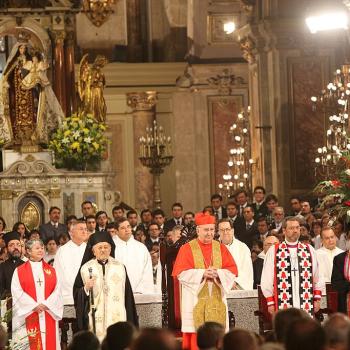 In the aftermath of the revelations of sexual abuse and its cover up by various leaders of the church, we should never forget the reason for our outrage. We must never forget the harm which many have suffered at the hands of ordained minsters who they trusted. We should remember the victims, but we should do more than that, we should listen to them, hear their stories, no matter how difficult it is, and truly discern what happened, why it happened, and what we can do to prevent it from happening again. We should listen to them and do what we can to help them with the healing they need. We should listen to them, let them speak without distraction, and let their voice resonate. We must remember that we are not talking about theoretical abuses, but actual harm which real people have suffered, real people with lives and dignity of their own which should never be ignored nor forgotten.
In the aftermath of the revelations of sexual abuse and its cover up by various leaders of the church, we should never forget the reason for our outrage. We must never forget the harm which many have suffered at the hands of ordained minsters who they trusted. We should remember the victims, but we should do more than that, we should listen to them, hear their stories, no matter how difficult it is, and truly discern what happened, why it happened, and what we can do to prevent it from happening again. We should listen to them and do what we can to help them with the healing they need. We should listen to them, let them speak without distraction, and let their voice resonate. We must remember that we are not talking about theoretical abuses, but actual harm which real people have suffered, real people with lives and dignity of their own which should never be ignored nor forgotten.
We must not let ecclesial infighting, power struggles, and scapegoating detour us our duty to remember the victims and listen to them. We must not let our concern be diverted. We must remember why so many people are hurt and angered. We must not let those who have been hurt to be hurt some more by becoming mere pawns in a long-standing ecclesial fight. Those who invoke the victims merely for the sake of their power show no real interest in engaging the reforms needed to prevent such abuse from happening again.
We must not allow the dignity of the victims to be further harmed by being thrown to the side by those who have no real care or concern for what they have suffered but only care for how they can be used to gain important positions within the hierarchy of the church. Those who have shown no concern for sexual abuse, and indeed, have shown derision in the past to those who have talked about their own stories of abuse, should be looked upon with suspicion if they seek to use the current crisis for their own ecclesial goals which have nothing to do with reform but placing themselves in positions of power. They might promise reform, but they will not give it: they will reinforce the power structures which have allowed for abuse to happen if they get such positions for themselves. It is likely they will find some group to scapegoat and attack, saying by doing so that they have handled the crisis; this, however, will lead them away from the institutional reforms which we need the most, allowing for the abuse to continue, worse than ever before.
The crisis before us is simple in describing, but complex in figuring out how to handle it properly. This makes it easy for people to use the crisis for their own advantage. If some speak up in ways to divert us from remembering the crisis and the victims, we must stop, pause, and return our focus to the problem at hand. The crisis shows that evil has been done in the church, by leaders and officials in the church, to others in the church (and those outside the church as well). They have been protected and hidden by others within the church – bishops, other priests, perhaps even laity who knew about the abuse but said and did nothing. The abusers come from all walks of life, all ideological persuasions. The problem is not a “liberal” vs. “conservative” issue, and those who try to turn the crisis into a conflict between ideological positions will be diverting us away from the crisis and using it for their own advantage. There are problems which can be found in the way all sides have dealt with the abuse; there are constant calls for reform which seek simple, easy answers, accusing ideological opponents, saying if those opponents are removed, reform would be established. This is a false turn which must not be accepted. Where there are faults, we can and must acknowledge them, no matter whom the fault can be found (this can, and will likely include, saints, as should not be surprising if people study the history of saints and see the great faults of the saints laid out before them).
What should be done? I do not have the answers. No one person is going to have them. This is why we need to talk about this together and explore together, rationally and with care and sensitivity for the abused, the causes of the crisis and the actions we can take to not only rectify the situation but to help those who have been hurt. Those of us within the church need to talk with each other, but it must not stop there. There needs to be an openness to learn from others: ecumenical and inter-faith dialogues, where people of various religious traditions discuss their own common problems and the kinds of solutions they can establish together will help us from ignoring obvious blinds spots which could otherwise be used to keep such abuse going. These dialogues, once again, must allow the voices of the victims to be heard, and not glossed over, so as to remember this is truly a problem which affects real people who have suffered greatly through the abuses of others.
Likewise, there needs to be an open dialogue with civil authorities, to find a way to become more interactive with them, indeed, to be transparent with them, not only about what happened in the past, but what is happening in the present and as to what might happen in the future. Transparency will help, but it will not do everything. Transparency is about admitting the problem; as with confession, there needs to be more than mere statements of the sin, but resolution to overturn it, to heal the harm done by sin, with resolutions which must be active and proactive. What those actions are must be determined communally, and they must be done in such a way to exorcise the evil, so that those who have been shown to cause harm will no longer be able to cause that harm again even as what can be done to heal the harm done, must also be done by the church.
There will be the need for institutional reform. The laity will need to have more voice in relation to what is done when abuse is exposed. They must not be ignored or forgotten. Certainly, this is not to say the laity will be perfect and abuses will be stopped merely because the laity are involved, but keeping them involved will help, for what is kept hidden will be harder to exorcise than what is out in the open.
There will be need for reform which is not a once-and-for-all reform, but reform which recognizes the church has to be a church which is always reforming itself. If and when it is thought “the solution” has been given, then it becomes easy to play the system which has been set up, and abuses to develop once again.
There will be the need to actively engage the political power structure which exists in the church, because sexual abuse is often tied to power itself. Clericalism creates the structure which allows for abuse, as clericalism attracts those who desire power to seek after and take positions of authority over those who do not. And since those who love power like to exercise it, sexual abuse will be one way in which that power will be demonstrated. Recognizing this is important. Nonetheless, this is not to say that there should be no bishops, no priests, no positions of ecclesial authority in the church (that would be scapegoating as well), but how those positions are employed need to be questioned and improved. Taking the laity seriously will go a long way to doing that, but it would fall short if that is all that is done.
There is the need for all the faithful to come together and suggest ideas for what we can do to help stop abuse and help those who have been abused. We must let those ideas be explored. We need to take the good which is offered, and see what we can do.
But even when explore the root causes of abuse and try to stop such abuses from happening again, we must never forget the reason why we are doing this. There have been victims who have been hurt by the church, and their lives matter. Their dignity matters We must listen to their stories, and we must do so first and foremost for their own good, out of compassion and care for them, and not even for the sake of promoting ecclesial reforms. Certainly, listening to their stories will help us as the church undergoes needful reforms. But if that is all we listen to them for, we have failed them and we are just using them for our own advantage, acting like those who abused them. We must listen to them and never forget their lives matter. We must remember the victims first and foremost for their own sake. Anything else will fail them.
[IMG=Crying Woman [CCO Public Domain] via MaxPixel]
Stay in touch! Like A Little Bit of Nothing on Facebook















